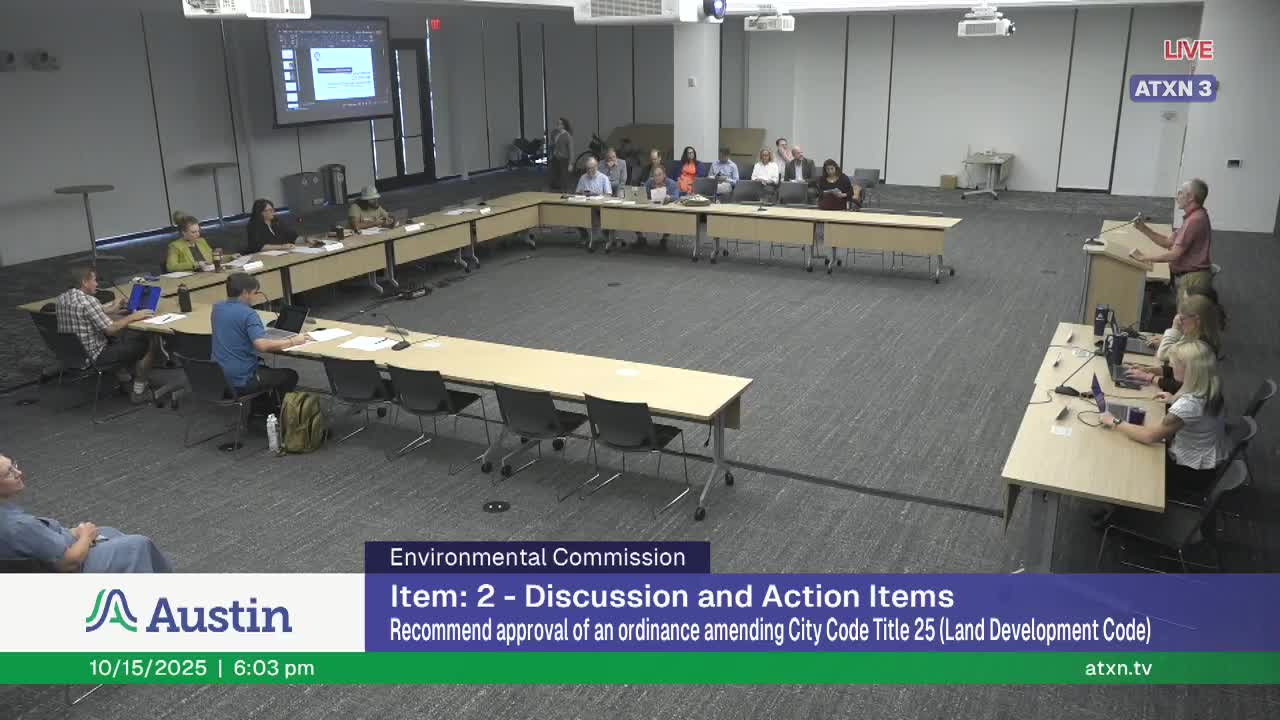Environmental Commission backs administrative variance to skip drainage easements on city parkland, adds Parks Board review
Get AI-powered insights, summaries, and transcripts
Subscribe
Summary
The Environmental Commission voted to recommend an amendment to City Code Title 25 that would allow the Austin Watershed Protection director to grant an administrative variance exempting city‑owned park projects from the requirement to record drainage easements for the 100‑year floodplain.
Environmental Commission members voted to recommend an amendment to City Code Title 25 that would let the director of Austin Watershed Protection grant administrative variances so development projects on city-owned parkland would not always be required to dedicate recorded drainage easements.
The commission moved the recommendation by a formal motion read into the record and approved it 8–1 after adding an amendment that requires the Parks and Recreation Department to be given a presentation on the change and an opportunity to vote on it. The commission chair said the law department will still review the final draft before the item goes to the Planning Commission and ultimately to City Council.
The change would add language to the Land Development Code (proposed section 25-7-152(e)) allowing staff to exempt parkland projects from the code requirement to record a drainage easement that traces the limits of the 100-year floodplain. "The current land development code requires that when a piece of land is developed, the portion of that land that's in the 100 year floodplain has to be contained within a drainage easement," said Kevin Shunk, the city's floodplain administrator in Austin Watershed Protection. He told commissioners the requirement means future owners are informed of flood risk but is time- and cost-intensive to implement for public projects.
Shunk said the department's proposal is administrative: "Our recommendation is to add a clause in the land development code that gives the director of the Austin Watershed Protection Department the authority to approve a variance to the drainage easement requirement on projects that are on city parkland." He said the proposal would let staff grant variances so parks projects can proceed without the cost and schedule delay of hiring surveyors, engineers and attorneys to record formal easement documents.
Supporters of the change framed it as an efficiency and public‑spending measure. Commissioners pressed staff for procedural details, including how the parks board had been notified. Diane Williams of the Parks Department confirmed staff sent the memo to every Parks Board member; watershed staff said the parks department initiated the concept and that the item had been an informational memo rather than a Parks Board action request.
Public comment included concerns about preserving parkland and public input. "I read this item, and I'll confess to you, I found it extraordinarily confusing," resident Chris Flores said. Flores asked why parkland — often land intentionally kept undeveloped because it floods — should be treated differently than private property. He urged the commission to prioritize fiscally conservative and environmentally respectful stewardship of parkland.
Commissioners asked whether removing the easement requirement would weaken floodplain protections. Shunk and other watershed staff repeatedly said the change would not remove floodplain regulations or other code protections for development in floodplain: "If there's floodplain on the lot, the floodplain regulations apply, easement or no easement," Shunk said. Staff also noted some uses of parkland (for example, a regional detention change in use) would still trigger the Chapter 26 public‑process requirements for parkland disposition.
Commissioners debated process and clarity of the code language. One commissioner moved an amendment requiring the Parks Board be given a presentation and an opportunity to vote; the motion to add that requirement passed without objection. Another commissioner proposed tabling the recommendation to allow rewording for clarity and fuller Parks Board input; that motion did not receive a second.
Next steps: commissioners directed staff to incorporate the commission’s amendment and continue legal review; watershed staff said the item will return to the Planning Commission and then go to City Council (the staff schedule discussed a January City Council hearing). Staff repeatedly emphasized that the city will still enforce floodplain regulations on any development and that the change only affects whether a recorded drainage easement is required for city‑owned parkland projects.
Why this matters: the proposal aims to save time and public funds on park improvement projects by avoiding the cost and schedule of recording drainage easements while maintaining floodplain regulation enforcement. Opponents urged clearer language and additional public input because the rule change affects how the city documents and treats floodplain on parkland.
Votes at a glance: the commission approved the recommendation, with the added requirement that the Parks Board receive a presentation and opportunity to vote. The motion passed 8–1.
What’s next: staff will incorporate legal edits, provide the Parks Board the requested presentation, and the item will proceed through Planning Commission and City Council for final action.
